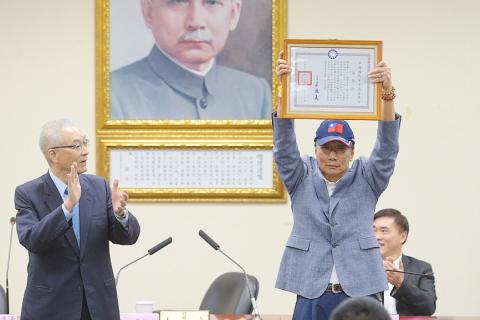Hon Hai Precision Industry Co (鴻海集團) chairman Terry Gou (郭台銘) yesterday confirmed his intention to run in the Chinese Nationalist Party (KMT) presidential primary, saying that he was told to do so in a dream by the goddess Matsu.
“Matsu told me to come out,” Gou said while visiting Cihui Temple (慈惠宮) in New Taipei City’s Banciao District (板橋).
He said he was awaiting instructions from Holy Emperor Guan on how to help the nation’s “poor masses and its youth,” which would be sent to him via public opinion polls.

Photo: Chang Chia-ming, Taipei Times
In the afternoon, Gou attended a ceremony at which KMT Chairman Wu Den-yih (吳敦義) gave him a Central Standing Committee “honorary certificate,” while referring to him as a “comrade” and “fellow party member.”
The certificate was understood to be a response to questions about Gou’s eligibility to run in the party’s primary as he had not been paying dues.
Gou said that the KMT must establish a primary that is “open and in touch with the people” to set a good precedent.
He would not accept the nomination without first going through the primary process, he added.
“A fair, open and transparent primary that is in touch with public sentiment is the first step toward establishing public trust in the KMT and developing the spirit of the party,” he said.
He has always valued peace, stability, economic prosperity and a better future above all else, whether as a businessman or while exploring other opportunities, which he is “very likely to do,” Gou said.
He said he hopes to work with the KMT to help it find its “party spirit and the honor of being a party member,” as well as to help it attract younger members.
Before yesterday’s ceremony, Gou bowed before photographs of Republic of China founder Sun Yat-sen (孫逸仙), and former presidents Chiang Kai-shek (蔣介石) and Chiang Ching-kuo (蔣經國).
Gou criticized former president Chen Shui-bian (陳水扁) for dismantling Chiang Ching-kuo’s office, which had remained in place until Chen took office.
Gou also said that he fondly remembers a couplet written by Chiang Ching-kuo that reads: “When calculating benefit, calculate for the benefit of the masses. When seeking fame, you should seek to be remembered through all the ages.”
Additional reporting by Chou Hsiang-yun and Lai Hsiao-tung

US President Donald Trump yesterday announced sweeping "reciprocal tariffs" on US trading partners, including a 32 percent tax on goods from Taiwan that is set to take effect on Wednesday. At a Rose Garden event, Trump declared a 10 percent baseline tax on imports from all countries, with the White House saying it would take effect on Saturday. Countries with larger trade surpluses with the US would face higher duties beginning on Wednesday, including Taiwan (32 percent), China (34 percent), Japan (24 percent), South Korea (25 percent), Vietnam (46 percent) and Thailand (36 percent). Canada and Mexico, the two largest US trading

ACTION PLAN: Taiwan would expand procurement from the US and encourage more companies to invest in the US to deepen bilateral cooperation, Lai said The government would not impose reciprocal tariffs in retaliation against US levies, President William Lai (賴清德) said yesterday, as he announced five strategies to address the issue, including pledging to increase Taiwanese companies’ investments in the US. Lai has in the past few days met with administrative and national security officials, as well as representatives from various industries, to explore countermeasures after US President Donald Trump on Wednesday last week announced a 32 percent duty on Taiwanese imports. In a video released yesterday evening, Lai said that Taiwan would not retaliate against the US with higher tariffs and Taiwanese companies’ commitments to

‘SPECIAL CHANNEL’: Taipei’s most important tasks are to stabilize industries affected by Trump’s trade tariffs and keep negotiations with Washington open, a source said National Security Council Secretary-General Joseph Wu (吳釗燮) arrived in the US for talks with US President Donald Trump’s administration, a source familiar with the matter said on Friday. Wu was leading a delegation for a meeting known as the “special channel,” the Financial Times reported earlier. It marked Trump’s first use of the channel since returning to the White House on Jan. 20. Citing a source familiar with the matter, the Financial Times reported that Minister of Foreign Affairs Lin Chia-lung (林佳龍) was also a part of the delegation. The visit came days after China concluded war games around Taiwan and amid Trump’s

CHIP EXCEPTION: An official said that an exception for Taiwanese semiconductors would have a limited effect, as most are packaged in third nations before being sold The Executive Yuan yesterday decried US President Donald Trump’s 32 percent tariff on Taiwanese goods announced hours earlier as “unfair,” saying it would lodge a representation with Washington. The Cabinet in a statement described the pledged US tariffs, expected to take effect on Wednesday next week, as “deeply unreasonable” and “highly regrettable.” Cabinet spokeswoman Michelle Lee (李慧芝) said that the government would “lodge a solemn representation” with the US Trade Representative and continue negotiating with Washington to “ensure the interests of our nation and industries.” Trump at a news conference in Washington on Wednesday announced a 10 percent baseline tariff on most goods